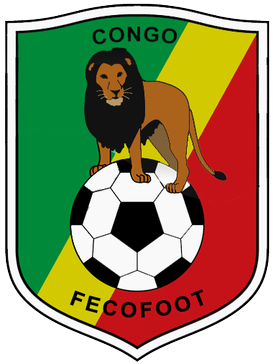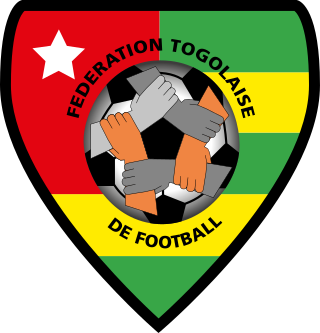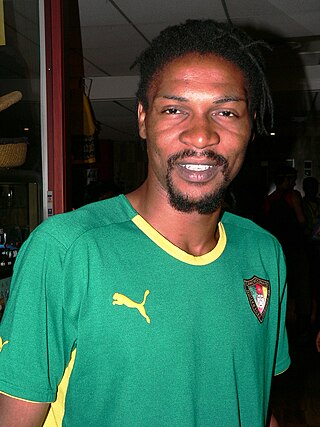
George Tawlon Manneh Oppong Ousman Weah is a Liberian politician and former professional footballer who served as the 25th president of Liberia from 2018 to 2024. Before his election for the presidency, Weah served as senator from Montserrado County. He played as a striker in his prolific 18-year professional football career which ended in 2003. Weah is the first African former professional footballer to become a head of state, and the only African Ballon d'Or and FIFA World Player of the Year winner in history, winning both awards in 1995. He won the African Footballer of the Year 3 times and is considered one of the greatest strikers ever.

The Cameroon national football team, also known as the Indomitable Lions, represents Cameroon in men's international football. It is controlled by the Fédération Camerounaise de Football, a member of FIFA and its African confederation CAF.

Trésor Lomana LuaLua is a Congolese professional footballer who played as a striker. He is currently the attacking coach for Spalding United.

The DR Congo national football team, recognised by FIFA as Congo DR, represents the Democratic Republic of the Congo in men's international football and it is controlled by the Congolese Association Football Federation. They are nicknamed Les Léopards, meaning The Leopards. The team is a member of FIFA and the Confederation of African Football (CAF).

The Ivory Coast national football team represents Ivory Coast in men's international football. Nicknamed the Elephants, the team is managed by the Ivorian Football Federation (FIF). The team has won the Africa Cup of Nations three times, in 1992, 2015 and 2024, and has qualified for the FIFA World Cup three times, in 2006, 2010, and 2014.
The Zambia national football team represents Zambia in association football and is governed by the Football Association of Zambia (FAZ). During the 1980s, they were known as the KK 11, after founding president Dr. Kenneth Kaunda ("KK") who ruled Zambia from 1964 to 1991. After the country adopted multiparty politics, the side was nicknamed Chipolopolo which means the "Copper Bullets". The team won an Africa Cup of Nations title in 2012. This team has also become the most successful team in the COSAFA Cup, surpassing Zimbabwe after winning the 2023 edition.

The Congo national football team represents the Republic of the Congo in men's association football and is governed by the Congolese Football Federation. They have never qualified for the World Cup, but did win the Africa Cup of Nations in 1972. They also won the All-Africa Games football tournament in 1965. The team is also a member of both FIFA and the Confederation of African Football (CAF).

The Togo national football team represents Togo in international football and is controlled by the Togolese Football Federation. The national football team of Togo made their debut in the FIFA World Cup in 2006. Their team bus underwent a fatal attack in Angola prior to the 2010 Africa Cup of Nations. They withdrew and were subsequently banned from the following two tournaments by the Confederation of African Football (CAF). In 2013 for the first time in history, Togo reached the quarter-finals of the Africa Cup of Nations. The team represents both FIFA and the Confederation of African Football (CAF).

The Angola national football team represents Angola in men's international football and is controlled by the Angolan Football Federation. Nicknamed Palancas Negras, the team is a member of both FIFA and the Confederation of African Football (CAF).

Rigobert Song Bahanag is a Cameroonian former professional footballer who was most recently the manager of the Cameroon national team.

Otto Martin Pfister is a German football manager and one of Germany's most successful coaching exports, voted Africa's Manager of the Year in 1992. He is formerly the manager of the Afghanistan national team.
James Salinsa Debbah is a Liberian professional football manager and former player who played as a forward. He was the manager of the Liberia national team from 2013 to 2017.

Paulo Jorge Rebelo Duarte is a Portuguese retired footballer who played as a central defender, currently a manager.
Tom Saintfiet is a Belgian football coach and former player. He is the current head coach of the Mali national team.

Hervé Jean-Marie Roger Renard is a French professional football coach and former player who is the head coach of Saudi Arabia.

Faouzi Benzarti is a Tunisian professional football manager and former player and current manager. He spent his entire career as a player at his home club US Monastir without any achievements. His coaching career began when he was only 29 years old, making him the youngest Tunisian coach at the time. He is considered one of the most successful coaches in Tunisia. He usually uses offensive play and a high-pressure plans as he is known for his toughness in training and his excessive anger towards his players and referees. During his managerial career, he was in charge of two national teams: the Tunisian and Libyan national football teams, he was also close to signing with the Moroccan team in 2016 before appointing Hervé Renard.
Trésor Mputu Mabi is a Congolese former professional footballer who played as a midfielder.
The 2013 Africa Cup of Nations was an international football tournament held in South Africa from 19 January until 10 February 2013.
This is a list of records and statistics of the Africa Cup of Nations.
Yusif Basigi is a Ghanaian professional football manager who currently coaches the Hasaacas Ladies F.C. and the Ghana women's national under-20 football team. He previously coached former Ghana Premier League team; Sekondi Hasaacas in 2016, Ghana women's national under-17 football team and Ghana women's national football team for 5 years from 2012 to 2017.













